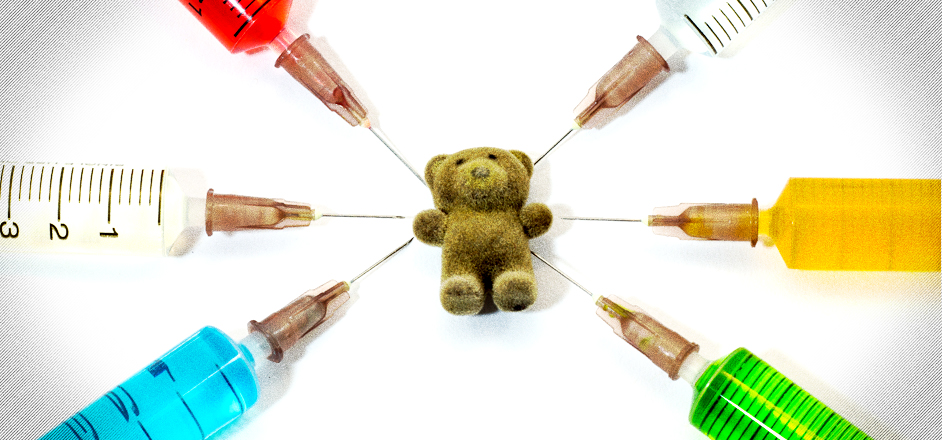They are the smallest victims of America's biggest drug crisis.
In a nondescript brick building in Aurora, Colo., a bunch of kids, ranging in age from age 7 to 12, regularly gather in a circle to talk about their families. They draw pictures of the bad things that happen in their houses: mom and dad yelling in the hallway, the police coming and taking their daddy away, how their parents make "art" out of tinfoil and then put lighters underneath.
"Some of them have even seen their grownups with needles in their arms," says Sloan Solomon-Komadina, a Children's Counselor at the Hazelden Betty Ford Center, who helps them through a problem much more sinister than what most kids have to face: a parent or close relative addicted to opioids.
"Often times, kids are hurt the most and helped the least, because grownups don't see what's going on with them," says Solomon-Komadina. Especially those parents in throes of addiction.
When this happens, kids tend to suffer in silence. They withdraw. And so, parents don't seek treatment for them, studies say, because the kids can seem fine. "And we know from research that that's not true," Solomon-Komadina says.
Often, what affects children of opioid addicts the most is the overdose deaths of their parents — prescription pain pills have killed about 200,000 adult sufferers this century and are the leading cause of accidental death in the United States. However, even if family members don't die, opioid-addicted parents often neglect their kids, forgetting to feed them or take them to school, something that studies have found leads to depression, ADHD, anxiety, OCD, and even psychotic tendencies.
And with the recent uptick of opioid and heroin overdoses in the past few years, Solomon-Komadina says she's seen more of these opioid-affected kids now than ever.

Heroin and opioids are sometimes thought of as a street problem, the drug of choice for the strugglers who hang out on street corners with cardboard signs. But in affluent suburbs, including places like South Aurora, where the Betty Ford addiction treatment center is located, heroin and opioids are now about as easy to get as Pizza Hut. According to Sam Quinones, author of the book “Dreamland: The True Tale of America's Opioid Epidemic,” you can ring drug dealers on their cell phones, and delivery drivers will come straight to your door.
"White people — especially middle class white kids" in Denver, Quinones writes, "didn't want to go to skid row or some seedy dope house to buy their drugs. Now they didn't need to. The [dealers] would deliver it to them."
In terms of how opioids are consumed, that ease of access meant drug use was able to travel indoors off the street and into the home; in full view of the kids.
The Betty Ford clinic is named after a president's wife, a woman who was addicted to both alcohol and opioids. "I liked alcohol," she wrote, "and I loved pills." Her center was dedicated to helping both addicted parents and their kids. For the kids, the center specializes in an immersive, four day program aimed at helping kids cope. The kids learn the basics of addiction, work on talking about their feelings, do art projects and work with the whole family to try to help it repair. After the four-day program, there are support meetings and after-school programs. The center reports that it's helped kids get their lives back on track.
Perhaps surprisingly, Solomon-Komadina says that effects of an opioid addiction on a child aren't that different from those of alcohol, a more common drug. The kids still feel abandoned and overlooked, the parents mentally absent. So, the center uses the same approaches to prescription pills as they do for booze.
"Addiction is addiction," she says. She'll tell the kids: "Some people might crush up their drugs, some people might use a needle, some people put drugs in a piece of paper and roll it up. But people who use alcohol and drugs are not bad people."
There are differences, though. Opioid-addicted parents are more likely to relapse than alcoholics, and their kids are more likely to end up in foster care or to live with grandma and grandpa since the state sees heroin addiction as more of a reason to take custody of kids than alcoholism. Also, the kids are less likely to talk to a counselor, since they're taught that heroin addiction is more shameful than other addictions.
There are more dire outcomes, too. The rate of toddlers hospitalized by mistakenly taking their parents opioids more than doubled between 1997 and 2012, says a study, and hundreds of kids have died.
Helping the kids who make it through this has become a massive undertaking. To deal with it, a place like the Betty Ford clinic always tries to help the kids on their terms.
"A lot of kids think they're the only ones going through this," Solomon-Komadina says. As opioids continue to be smashed, snorted, shot and inhaled in record numbers, she'll be more and more correct when she tells them, as she often does, "that they are not alone."





Leave a Reply
You must be logged in to post a comment.